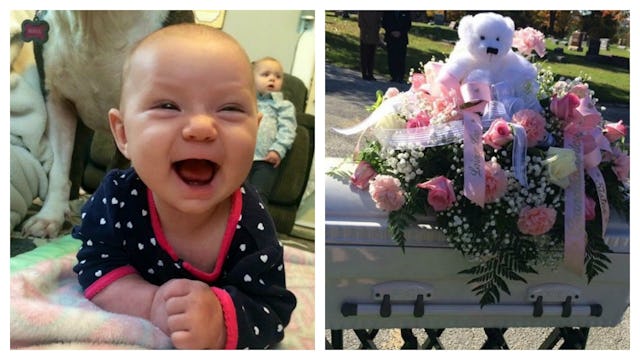There Is A Sad Rivalry In Child Loss, And This Is It

Throughout my adulthood, I’ve experienced two forms of death which have molded me into the woman I am today. As we started a family, an early miscarriage stood in our way, and my most recent and life-altering loss was that of my precious four-month-old daughter, Lainey.
Lainey drifted away in the silence of a muggy, Sunday morning. The pain associated with that day is still excruciatingly painful and is a cross I will carry with me for the rest of my life.
Caila Smith
As the news of my daughter’s passing started to unfold, many mothers offered their support by sharing stories of their own loss. But while I was in the early stages of my grief, I didn’t think anyone’s story could compare unless they also had endured the loss of a child who had lived a life on Earth. I harshly thought to my then-self, “You don’t understand my pain because you didn’t know your baby. You didn’t rock her to sleep, see her smile, or hear her coos.”
And I think these moms felt those harbored feelings which I thought I had masked, because they would always degrade their own hurt by emphasizing, “I know my pain doesn’t compare to yours.”
But as time went on, it took a friend’s innocent (but hurtful) comment about a fellow, bereaved mother’s loss for me to understand just how mistaken I had been. This mom we spoke of seemed to wear the weight of her adult daughter’s loss just as heavily as the day she left this world. And my friend, exasperated, said to me, “But Caila, can you imagine losing your adult child?”
I thought to myself: “No! I can’t imagine what losing my adult child would be like, because my daughter didn’t get the chance to survive her childhood.”
I only know what it’s like to lose my infant daughter — and it hurts. It hurts like Hell. Suddenly, it felt as if a light bulb had switched inside my small-minded head. These fellow mothers, whom I had been internally ridiculing for their heart-felt stories knew my same pain. They longed for the little ones they lost just as badly as I did.
Their babies didn’t make it past birth, and I’d judged them for a hurt they never had the opportunity to experience. The sorrow they feel was and is no different than mine — we both share the same tear-stained pillows on our side of the bed.
Before we lost Lainey and my only experience with loss was my miscarriage, I was still heartbroken. I’ll never forget relaying my devastating news to family and friends, and how one of them required me to pick my jaw up off the floor. “Oh good,” she said. “I thought you were going to tell me you were miscarrying a real baby.”
But to me, I had miscarried a “real baby.” My baby was very real.
Her seemingly innocent remark made my pain feel minuscule, because there were plenty of other moms worse off than me — or so I had been so painfully reminded. And at that time, I didn’t have the experiences I have today. In that season of my life, I was fortunate to not have yet experienced a loss “greater” than a miscarriage.
Now I find myself asking, “Who gets to decide which life is worthy or unworthy to be grieved, based upon the number of days that life existed?” Because once we do that, we’ve labeled ourselves a judge — deciding which life has greater value over another.
Whether it be a life that knows nothing more than the sound of her mother’s heartbeat or a life that knows the chaos of this crazy world — each life is precious and worthy to be felt when lost.
To the moms who tried for years and years to get pregnant and couldn’t conceive — please know, you are rightful and more than justified to feel your pain as you grieve your loss. Just because the opportunity of losing a child was never presented does not mean you didn’t lose the hope and possibility of a life with the children you so desperately wanted.
It hurts me that I had to learn this lesson the way I did, but it leaves me with a powerful message to my fellow bereaved parents out there. Can we please stop the grief wars? Can we stop internally competing our loss with the thoughts of, “my pain is greater than your pain?” Because in the grand scheme of things, what two person’s pain is exactly the same? There is no rivalry in child loss — only hurting parents with broken hearts.
After all, there is no footprint too small that it cannot leave an imprint on this world.
Caila Smith
This article was originally published on